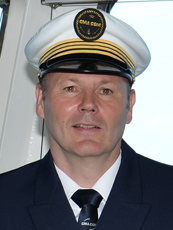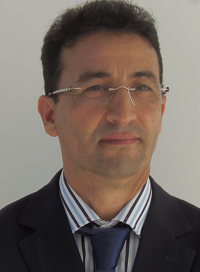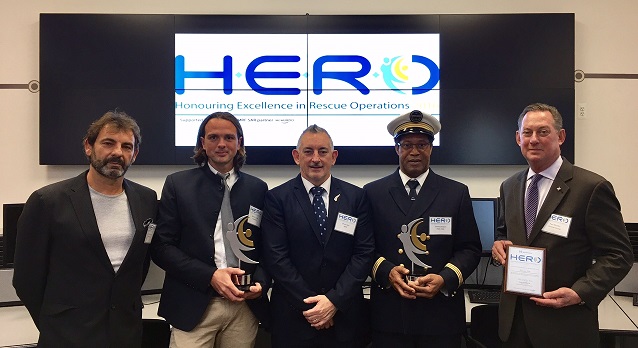Awards Recognize Dedication to Search and Rescue
The winners of the International Maritime Rescue Federation’s H.E.R.O (Honoring Excellence in Rescue Operations) awards were announced at ceremonies in Washington and Lisbon, Portugal, this week.
 Captain Herve Lepage from France received the individual award. Lepage, Master of the 277-meter (910-foot) container ship CMA CGM Rossini, and crew won their individual contribution award for the skilled search and rescue of the crew of the upturned catamaran Llama Lo off the South African Wild Coast on October 18, 2015. Lepage was involved in the search for Jean Sitruk, 65, and Kyle Castelyn, 20, after their capsized catamaran was found 50 miles off the Wild Coast, on South Africa's south eastern shores.
Captain Herve Lepage from France received the individual award. Lepage, Master of the 277-meter (910-foot) container ship CMA CGM Rossini, and crew won their individual contribution award for the skilled search and rescue of the crew of the upturned catamaran Llama Lo off the South African Wild Coast on October 18, 2015. Lepage was involved in the search for Jean Sitruk, 65, and Kyle Castelyn, 20, after their capsized catamaran was found 50 miles off the Wild Coast, on South Africa's south eastern shores.
Jean, from Lyon, France, and his crewman Kyle, from Strand, Cape Town, were on passage from the Maldives. The yacht was on autopilot, making 12-13 knots in rough seas. Both men were down below when, with a loud bang, the yacht momentarily stopped and then swung hard to port. Kyle saw a whale on their port side and water was flooding into the hull through a 70 centimeter (28 inch) hole. After watching the container ship for more than two hours slowly coming towards them Lepage sailed the Rossini up to the little yacht tender, leaving Kyle and Jean only a few meters to paddle to the side of the ship.
Proactiva Open Arms from Greece received the team award. The team was involved in the traumatic rescue of several hundred’ victims of people smuggling whose vessel broke apart in the sea off Lesbos with considerable loss of life. The team found hundreds of people in the water, some holding to large pieces of wood that had once been part of their boat.
The huge, old wooden boat fishing boat was so overcrowded the upper deck had collapsed. It had capsized near the border line between Turkey and the north of Lesvos. More than 350 people fell into the water. That day the sea was rough, and it soon became apparent that the Proactiva Open Arms Team would be the only team able to make a safe approach to the victims. They had to choose among hundreds of people who would be rescued first, sometimes taking children from the arms of their mothers. One of the most dangerous parts of the rescue was the transfer to Hellenic Coast Guard and Frontex vessels.
The U.K. and Ireland’s Royal National Lifeboat Institution’s (RNLI) James Benson and Bournemouth University received the technology award. They worked together to develop the Bottle Buoy, a device is aimed at low resource communities as a minimum cost flotation device that can be used as public rescue equipment and swimming instruction. The device is simple and allows three soft drink/water bottles to be attached to a central hub and produce around 60N of buoyancy.
Discarded plastic drinks bottles are now in abundance in many low resource environments. Instructions and a simple template have been developed to allow the bottle buoy to be produced in the local community using items that could be found easily. Production development and use testing has been undertaken in Bangladesh in partnership with the Seasafe Lifeguard Service in Cox's Bazar and Bournemouth University's Faculty of Science and Technology. The Bottle Buoy is now in use in Bangladesh and will undergo further testing before a final resource manual is made open source.
 Mohammed Drissi from Morocco received The Vladimir Maksimov Award sponsored by Inmarsat. Drissi first became aware of search and rescue in 1996 when his 148 meter RO-RO rescued 12 people that had been onboard a small wooden vessel that was in distress in rough seas. This was his very first search and rescue mission and it would not be his last. It inspired him to learn more.
Mohammed Drissi from Morocco received The Vladimir Maksimov Award sponsored by Inmarsat. Drissi first became aware of search and rescue in 1996 when his 148 meter RO-RO rescued 12 people that had been onboard a small wooden vessel that was in distress in rough seas. This was his very first search and rescue mission and it would not be his last. It inspired him to learn more.
After joining the Moroccan Ministry of Fisheries in 1998 he soon became a SAR regional coordinator, and by 2000 he was overseeing the development of the Moroccan SAR services as part of RMRCC Rabat. To this day he continues to dedicate himself to search and rescue as the Regional Coordinator for IMO for the Rabat SAR region. This region links six countries, and he works across the borders and boundaries demonstrating true leadership in guiding the SAR development across the Regions of Africa.
This is just a small glimpse at the influence that Mohammed has had on search and rescue and over 20 years after his first encounter with search and rescue he is still sharing his experience and knowledge with the search and rescue community.
Vladimir Maksimov was also posthumously recognized with a H.E.R.O Lifetime Achievement Award for his contribution to maritime safety. Maksimov, who passed away earlier this year, worked tirelessly on the continuing development of GMDSS over the course of a 25-year career at Inmarsat and played a central role in the Inmarsat safety team.
A local award was presented to The Maritime Rescue Coordination Centre - MRCC Lisboa & MRCC Delgada in Lisbon. Portugal has the largest SAR Region of the entire European continent. For a small sized country such as Portugal, this represents a responsibility across an area sixty-two times larger than the mainland, comprising more than five million square kilometers.
Both centers are responsible for coordinating the search and rescue at sea in the SAR Regions of Lisboa and Santa Maria. In 2015, the Portuguese SAR Service (MRCC Lisboa and Delgada) registered a total of 636 SAR events that resulted in 501 lives saved. This operational result was achieved with a high overall success rate of 97 percent, as defined by the IMO formulas for efficacy rate of rescue at sea.
The judges also made Special Commendation Awards to the NGOs acting in the Mediterranean and to The Italian Coastguard & MRCC in Rome for their life saving work for refugees and migrants in the Mediterranean and the Aegean.
Bruce Reid, CEO, IMRF, said: “We have all been impressed and humbled by the quality of the nominations for these awards. We congratulate the winners and thank all the nominees for their selfless commitment to saving lives across the world. 10s of 1,000s of people are rescued every year, the awards are our way of saying thanks to everyone involved in the SAR.”

The H.E.R.O. Awards have been developed in cooperation with IMRF partner McMurdo to draw attention to the life-saving work done in Search and Rescue across the world.
The H.E.R.O. Awards are designed to:
• raise awareness of the excellent work done by all those involved in the maritime SAR community, with the aim of increasing Government, commercial and public recognition, support and funding
• reward the selfless efforts and achievements of individuals who make sacrifices to save lives, on the water or in support
• raise awareness of innovative SAR products, technologies and processes with the aim of spreading ideas for improvement

that matters most
Get the latest maritime news delivered to your inbox daily.
• raise awareness of the role and responsibilities of the IMRF with the aim of increasing membership and participation.
Entries are open for next year’s award and will close 30th June, 2017. More information is available here.
